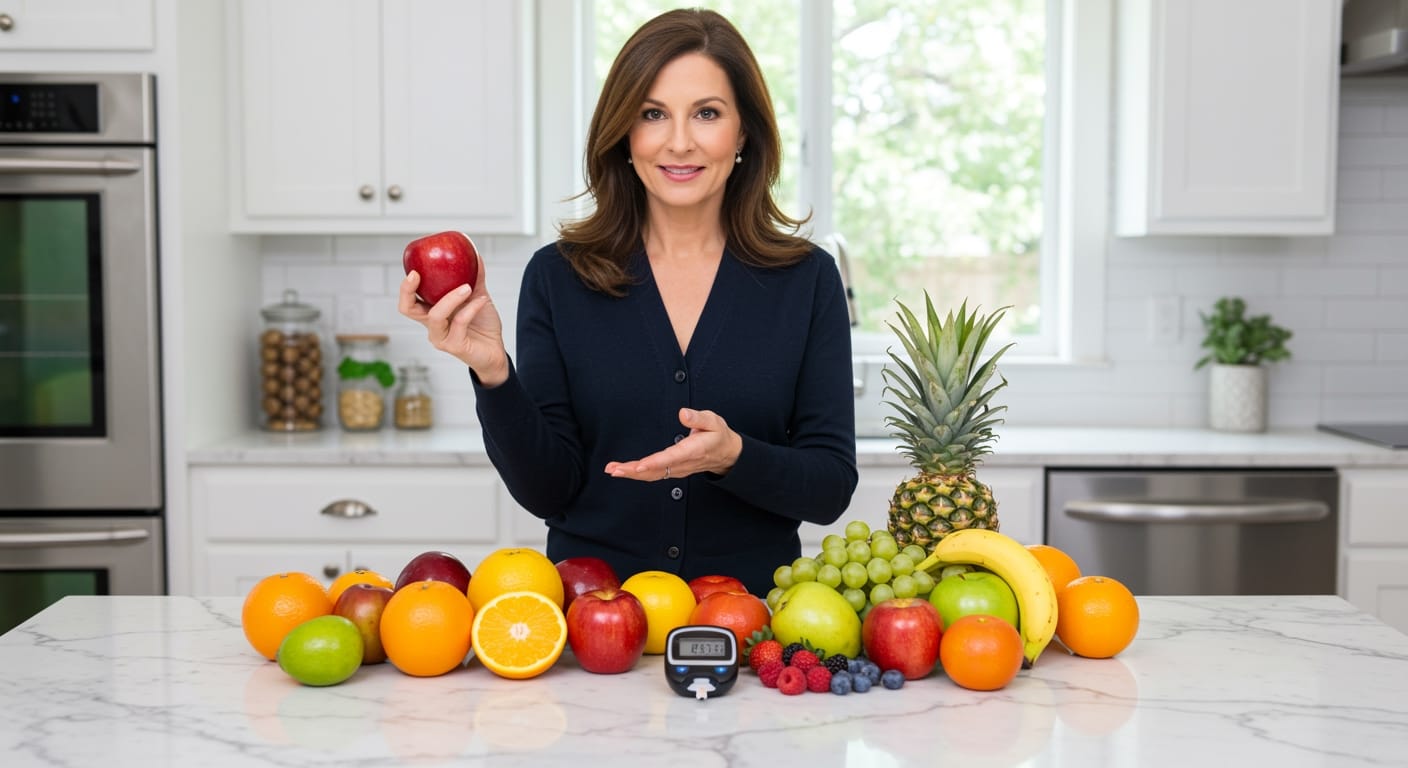✪ Key Takeaway: Diabetics can safely enjoy whole fruits in moderation because natural fruit sugars come with fiber that slows absorption.
Introduction
Your doctor tells you to avoid fruit because of the sugar content.
You might be wondering if natural fruit sugars are really as dangerous as added sugars for your blood glucose levels.
Hi, I’m Abdur, your nutrition coach and today I’m going to explain the truth about natural fruit sugars and diabetes management.
What Makes Natural Fruit Sugars Different?
Natural fruit sugars come packaged with fiber, water, and essential nutrients that change how your body processes them.
When you eat an apple, the fiber creates a protective barrier that slows down sugar absorption into your bloodstream.
This natural packaging system prevents the rapid blood sugar spikes you get from processed foods with added sugars.
The fructose in whole fruits gets metabolized differently than the high fructose corn syrup found in sodas and candies.
Your liver processes natural fruit fructose more efficiently because it comes with the cofactors and enzymes needed for proper metabolism.
Research shows that people who eat whole fruits have better blood sugar control compared to those who drink fruit juices or avoid fruit entirely.
✪ Fact: An apple contains about 19 grams of natural sugar but has 4 grams of fiber that slows absorption significantly.
How Do Whole Fruits Affect Blood Sugar?
Whole fruits have a lower glycemic index than most processed foods because of their natural fiber content.
The fiber in fruits acts like a sponge that absorbs water and forms a gel-like substance in your digestive system.
This gel slows down the digestion process and prevents rapid glucose absorption that causes blood sugar spikes.
Studies show that eating whole fruits can actually improve insulin sensitivity over time when consumed as part of a balanced diet.
The antioxidants in fruits help reduce inflammation that contributes to insulin resistance in diabetic patients.
Berries, apples, and citrus fruits contain compounds that may help your cells respond better to insulin signals.
However, portion control remains important because even natural sugars can raise blood glucose if consumed in excessive amounts.
✪ Pro Tip: Eat fruits with protein or healthy fats to further slow sugar absorption and improve blood sugar stability.
Which Fruits Are Best for Diabetics?
Berries top the list because they contain the highest fiber content relative to their sugar content.
Blueberries, strawberries, and raspberries provide powerful antioxidants while keeping blood sugar impact minimal.
Apples and pears with their skin intact offer excellent soluble fiber that helps regulate glucose absorption.
Citrus fruits like oranges and grapefruits contain pectin, a type of fiber that specifically helps with blood sugar control.
Stone fruits such as peaches and plums provide moderate sugar content with good fiber ratios when eaten fresh.
Avoid dried fruits and fruit juices because the concentration process removes water and fiber while concentrating sugars.
Tropical fruits like mangoes and pineapples can be enjoyed in smaller portions due to their higher natural sugar content.
✪ Note: One cup of fresh berries contains only 12-15 grams of natural sugar with 8 grams of beneficial fiber.
What About Fruit Timing and Portions?
The timing of fruit consumption can significantly impact your blood sugar response throughout the day.
Eating fruit in the morning helps provide natural energy while your insulin sensitivity is typically at its highest.
Post-workout fruit consumption can be beneficial because your muscles readily absorb glucose for recovery purposes.
Avoid eating large amounts of fruit late in the evening when your metabolism naturally slows down.
A reasonable portion size is one medium piece of fruit or half a cup of berries per serving.
Spreading fruit intake throughout the day rather than consuming multiple servings at once helps maintain stable blood sugar.
Monitor your individual response to different fruits using a glucose meter to identify which ones work best for your body.
✪ Pro Tip: Pair fruit with a handful of nuts or Greek yogurt to create a balanced snack that minimizes blood sugar spikes.
The Bottom Line
Natural fruit sugars should not be feared by diabetics when consumed as whole fruits in appropriate portions.
The fiber and nutrients in whole fruits make them fundamentally different from processed sugars, and avoiding them completely may rob you of important health benefits.
I would love to hear about your experiences with fruit and blood sugar management, so please share your questions or thoughts in the comments section below.
References
At NutritionCrown, we use quality and credible sources to ensure our content is accurate and trustworthy. Below are the sources referenced in creating this article:
- Medical News Today: Fruit and diabetes: What to know
- Diabetes Food Hub: What Are Natural Sugars and How Do They Impact Diabetes?
- American Diabetes Association: Fruit
- PubMed: Fruit consumption and risk of type 2 diabetes





